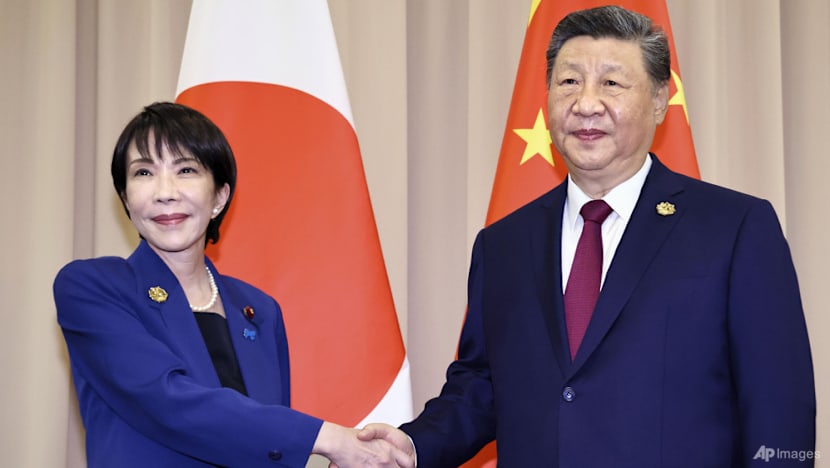How China-Japan relations took a sharp downturn after a single remark by PM Takaichi
The diplomatic row over comments on Taiwan has evolved from a war of words to Beijing advising its citizens against travelling and studying abroad in Japan.

Chinese President Xi Jinping shakes hands with Japanese Prime Minister Sanae Takaichi ahead of their meeting in Gyeongju, South Korea, Oct 31, 2025. (File photo: Kyodo News via AP)

This audio is generated by an AI tool.
SINGAPORE: A week after shaking hands with Chinese President Xi Jinping on the sidelines of the APEC Summit, Japanese Prime Minister Sanae Takaichi made comments in parliament that would spark a diplomatic row between the Asian giants.
She suggested that a Chinese attack on Taiwan could prompt a military response from Tokyo.
The remarks - and her refusal to withdraw them - have stoked anger in China, which lays claim to the self-governing island.
The diplomatic row has evolved from a war of words to Beijing advising its citizens against travelling and studying abroad in Japan.
Here’s how China-Japan relations soured rapidly in the past days - and what the potential consequences might be.
WHAT TAKAICHI SAID
During a Nov 7 parliamentary sitting, an opposition lawmaker asked about what could be deemed "a situation threatening Japan's survival" - a legal term introduced in 2015 that allows Japan to deploy the country's Self-Defence Forces.
Takaichi, seen as a China hawk, gave the example of a Chinese attack on Taiwan.
If an emergency in Taiwan entails "battleships and the use of force, then that could constitute a situation threatening the survival (of Japan), any way you slice it", Takaichi said.
She later added that an attack on US warships sent to break any Chinese blockade on Taiwan could require Tokyo to intervene militarily to defend itself and its ally.
The Japanese prime minister later said her remarks were "hypothetical" and that she would refrain from making similar comments in parliament again.
However, the 64-year-old refused to retract her comments, stating that her remark was in line with the Japanese government’s position.
Japan recognises the "One China" policy. Following Takaichi's comments, Chief Cabinet Secretary Minoru Kihara said that his government's position on Taiwan remains unchanged, but it has done little to quell Chinese anger.
WAR OF WORDS
The Japanese prime minister’s comments in parliament drew swift rebuke from Chinese state media and officials.
On Nov 8, China's Consul General in Osaka, Xue Jian, shared a news article on X and said: "The dirty neck that sticks itself in must be cut off."
The post was later deleted, but not before Japanese officials raised their objections against the “extremely inappropriate” comments. Senior political figures in Tokyo called for Xue's expulsion.
In an editorial on Nov 11, Chinese state broadcaster CCTV said Takaichi’s remarks were of "extremely malicious nature and impact" and have "crossed the line" with China.
As the spat dragged on, China's foreign ministry spokesperson Lin Jian told a news conference on Nov 13 that Takaichi’s remarks were a "crude interference" in its internal affairs, resulting in a “heavy blow” to bilateral relations.
"Should Japan dare to intervene militarily in the Taiwan Strait situation, it will constitute an act of aggression, and China will strike back decisively," he said.
This adds to his statement earlier in the week, calling Takaichi's remarks on Taiwan "wrongful and dangerous", and urging Tokyo to "take a hard look at its historical responsibilities".
On Nov 14, China said it has summoned the Japanese ambassador.
Hours later, Japan said it summoned Beijing's ambassador.
HISTORY OF ANIMOSITY
Strains in China-Japan relations occur periodically, plagued by bitter memories of Japan's wartime aggression.
In 2012, for instance, anti-Japanese protests erupted across many Chinese cities over the disputed Senkaku or Diaoyu islands.
In 2017, a Japanese hotel chain APA Group came under fire for books its president wrote denying that the Nanjing Massacre in wartime China ever happened.
Assistant Professor Stefanie Kam noted that the latest spat “centres on a new and more dangerous focal point”.
Takaichi’s comments marked the first time a sitting Japanese prime minister explicitly linked a Taiwan conflict to Japan’s survival and potential action by Tokyo under collective self-defence, said the assistant professor, who is part of Nanyang Technological University’s (NTU) China programme.
This sets it apart from other conflicts which have involved wartime history or the disputed Senkaku/Diaoyu islands, she told CNA.
However, to Assistant Professor Benjamin Ho, the latest dispute between the two countries is the least provocative compared to spats over the disputed islands or visits to Japan's Yasukuni shrine.
The shrine commemorates Japan's military dead, including some of its most notorious war criminals.
"It is no secret that there is a very strong shared affinity between Japan and Taiwan," said Asst Prof Ho, who is part of S Rajaratnam School of International Studies' China programme.
"The general idea that whatever happens in and to Taiwan will also, in some ways, implicate Japan is pretty obvious," he said.
"In other words, Prime Minister Takaichi is stating a very obvious point," he said, adding that he would not call her remarks unprecedented.
Before taking power last month, Takaichi was a vocal critic of China and its military build-up in the Asia-Pacific.
She has visited Taiwan and called for closer security cooperation. She also met separately with Taipei's representative at the recent APEC summit in South Korea.
On Sunday, Chinese Foreign Ministry spokeswoman Mao Ning urged Japan to honour its commitments in the 1972 Sino-Japanese Joint Statement, regardless of who is in power.
"In the 1972 Sino-Japanese Joint Statement, it is stated in black and white that ... 'The government of Japan fully understands and respects the stand of the government of the People's Republic of China that Taiwan is an inalienable part of the territory of the People's Republic of China'," said Mao in a post on X.
According to Japan's chief Cabinet secretary, Chinese coast guard vessels spent several hours in Japan's territorial waters around the disputed Senkaku/Diaoyu islands.
Related:
ECONOMIC IMPACT
The diplomatic spat could spell further bad news for Japan's economy, with China advising its citizens to avoid travelling to Japan and warning Chinese students in Japan that there were risks to their safety.
Over 100,000 Chinese students were enrolled in educational institutions in Japan last year, according to the Japanese government.
At least six Chinese airlines have said that tickets for trips to Japan before the end of December can be refunded or changed without charge.
China is Japan’s biggest source of tourists, and the row has hit shares in its travel and retail sectors hard, with prices plunging on Monday morning.
A downturn in Chinese visitor numbers similar to the 25 per cent fall Japan experienced during an earlier diplomatic row in 2012 could result in a significant economic loss, according to Takahide Kiuchi, executive economist at Nomura Research Institute.
"The China–Japan dispute over Taiwan and Beijing's advisory discouraging travel to Japan introduces near-term headwinds for consumer-facing sectors," added Masahiko Loo, a senior fixed income strategist at State Street Investment Management in Tokyo.
"Chinese visitors account for roughly 25 per cent of Japan's inbound traffic, making department stores, luxury retail, and hospitality particularly vulnerable," he told Reuters.
Reacting to China’s travel advisory, Japan's Chief Cabinet Secretary Minoru Kihara told reporters on Saturday that Beijing's call was "inconsistent with the promotion of a strategic and mutually beneficial relationship", Jiji Press reported.
HOW BAD COULD IT GET?
Beijing has been relying on a range of calibrated escalatory tools, and the situation had not developed into a full-blown trade embargo as seen before, said Asst Prof Kam.
“This suggests that Beijing may take a wait-and-see approach as Tokyo’s domestic politics, and economic considerations, given China is Japan’s largest trading partner, might play an important role in tempering the rhetoric by a hawkish Tokyo,” she said.
If a “full-blown trade spat” were to emerge, one of the biggest risks to Japan would be China restricting its exports of rare earths or imposing restrictions on Japanese exports, said Marcel Thieliant at economic forecaster Capital Economics.
"Carmakers look particularly vulnerable as they are already under enormous pressure from the ascent of Chinese electric vehicle manufacturers," he told AFP.
Takaichi’s remarks signal the current administration’s more nationalist and conservative stance as well as its hawkish views on China, said Asst Prof Kam.
The prime minister’s comment about Tokyo’s involvement and willingness to engage in war in a possible Taiwan contingency makes this dispute much more tightly bound up with East Asian security and the stability of cross-Strait relations, she added.
The two sides need to let the situation run its course, said Asst Prof Ho, when asked about steps the countries should take to bring down tensions.
"The Japanese would have 'learnt' from the issue and China would continue to 'remind' others that Taiwan is an internal matter and others should not intervene," he said.
HOW HAS TAIWAN RESPONDED?
Taiwanese President Lai Ching-te from the pro-independent Democratic Progressive Party said on Monday that China was carrying out a "multifaceted attack" on Japan, severely impacting peace and stability in the Indo-Pacific region.
"I call on the international community to continue paying close attention, and I also urge China to exercise restraint and demonstrate the conduct befitting a major power, rather than becoming a troublemaker for regional peace and stability," he said.
"China should return to a rules-based international order; only then will it be helpful for the region's development. We ask China to think twice."
A former legislator of the opposition Kuomintang (KMT) Party said in an interview with China Global Television Network on Sunday that Takaichi's statements risk dragging Taiwan into a crisis it can neither afford nor control.
"Takaichi's comment did not lean on a united Taiwan. In fact, it struck at one of Taiwan's deepest internal divides,” said Joanne Lei.
Takaichi’s remarks are worrying for the KMT and Taiwanese voters who oppose formal independence, she added.
“Not because Japan's support might be an empty promise, but because it could encourage Taiwan independence advocates to take reckless steps.”
The KMT traditionally espouses close relations with Beijing.


















